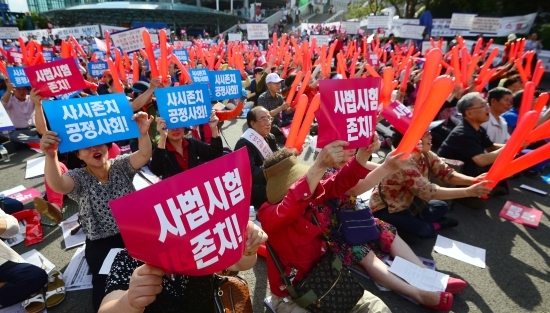Debates over the selection system for the legal profession are set to come to the fore again when the last group of individuals who pass the test will be unveiled, with the abolition of the state-run judicial examination slated for 2017.
The Ministry of Justice said earlier this month that 204 individuals passed the national bar exam in 2014 ― a big decline compared to 1,009 in 2004.
The number of legal trainees who passed the exam has continued to drop over the past decade, with only 506 in 2012 and 306 in 2013. The Justice Ministry plans to steadily reduce the number to 150 next year and 50 in 2017.
As the state judicial exam, introduced in 1963, is scheduled to be abolished in 2017, individuals who want to enter the legal profession have only two more opportunities (in 2015 and 2016) as the first round of tests for the three-step process will end in 2016.
 |
Protesters call for the government to retain the state bar examination in Seoul in September. (Korean Bar Association) |
From 2018, only individuals who studied for three years at 25 law schools nationwide and pass the “attorney-qualifying examination” will be allowed to become lawyers, prosecutors or judges. Non-law school graduates will be ineligible to take the attorney-qualifying exam, which was introduced in 2012.
The nation has been implementing a two-track screening system ― both the national bar and law school-based exams.
The law school system was introduced here in 2009.
Three years ahead of the scheduled scrapping of the national bar exam, some lawmakers and professors are reigniting a social debate on the necessity of continuing the two-track selection system after 2017.
Last week, a group of lawmakers and the Korean Bar Association cohosted a forum calling on the government to retain the state bar exam. Some officials from the Justice Ministry, law school professors, judges and prosecutors participated in the gathering at the National Assembly.
Among the participants were Rep. Kim Moo-sung, chairman of the ruling Saenuri Party and Rep. Lee Sang-min, chairman of the National Assembly’s Legislation & Judiciary Committee, of the main opposition New Politics Alliance for Democracy.
Yang Jae-kyu, deputy chief of the Korean Bar Association reiterated that the Law School Act was not enacted by public consensus, but was the result of a deal between some ruling and opposition party lawmakers concerning amendments to the Private Schools Act. He cited a recent poll that surveyed 1,000 adults, which showed that 73.5 percent considered the state judicial exam to be better than the law school-based selection in terms of providing equal opportunities for the haves and the have-nots.
Most participants appear to share the view that the heavy tuition fees at law schools will eventually block students from low-income households from entering the judicial sector.
Hongik University law professor Jang Yong-keun said that “it is not fair that (the nation would) change the free competition system to a monopolistic and oligopolistic law school system.”
Justice Ministry official Park Soon-bae made it clear that the ministry is also acknowledging the view that there should be a policy to secure chances for middle- and low-income brackets. “(The ministry) will reflect on a variety of opinions in deciding future policies on fostering the judiciary manpower,” he said.
A judge from the Office of Court Administration, a unit of the Supreme Court, said gaining public consensus by collecting a wide range of opinions should precede any future movement.
In September, Rep. Kim Yong-nam of the Saenuri Party had proposed a motion on revising the law on attorney selection.
Meanwhile, data from Statistics Korea showed a widening gap in education spending between high-income and low-income households. Families in the highest 20 percent income bracket spent 504,300 won ($460) per month on educating children last year, 6.58 times the expenditure by the lowest 20 percent.
By Kim Yon-se (
kys@heraldcorp.com)







![[Weekender] Korea's traditional sauce culture gains global recognition](http://res.heraldm.com/phpwas/restmb_idxmake.php?idx=644&simg=/content/image/2024/11/21/20241121050153_0.jpg)
